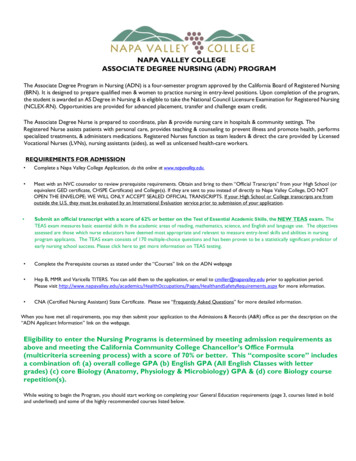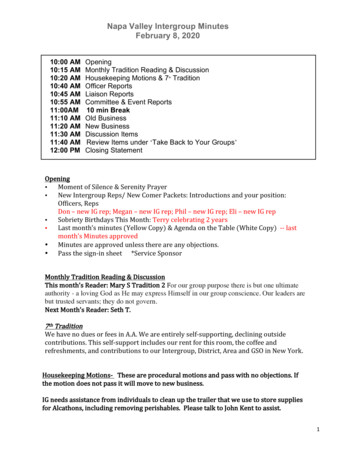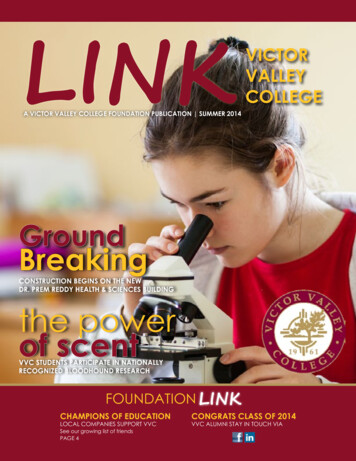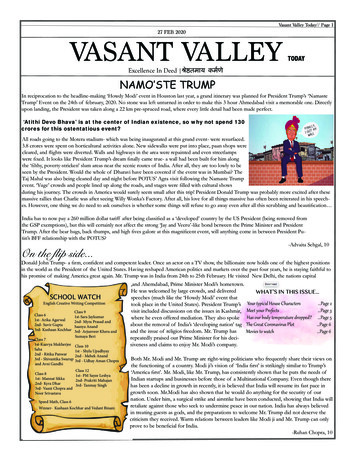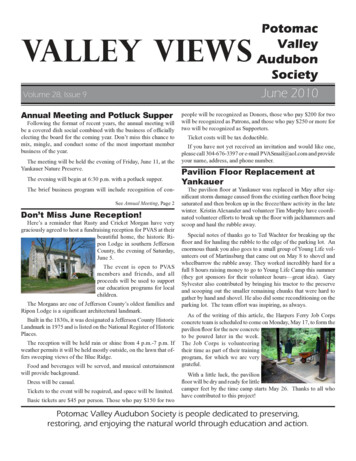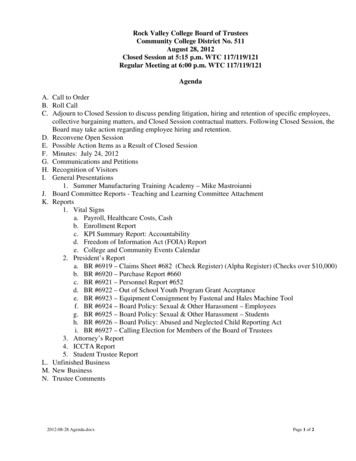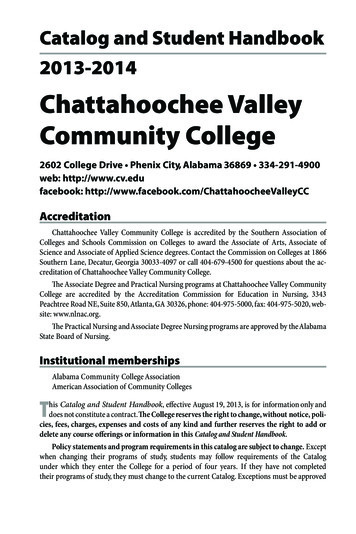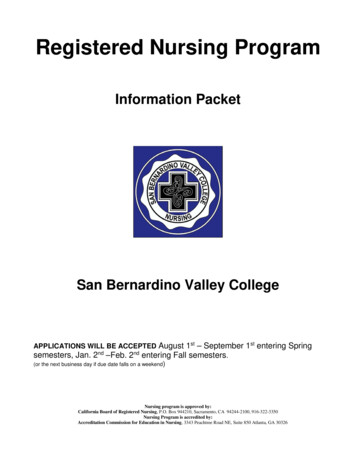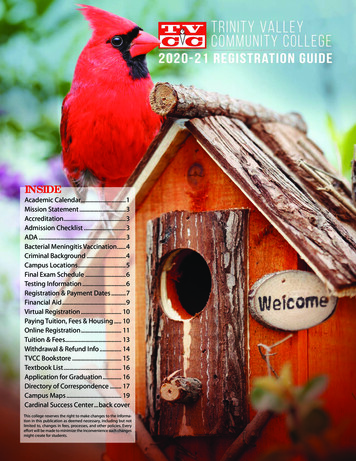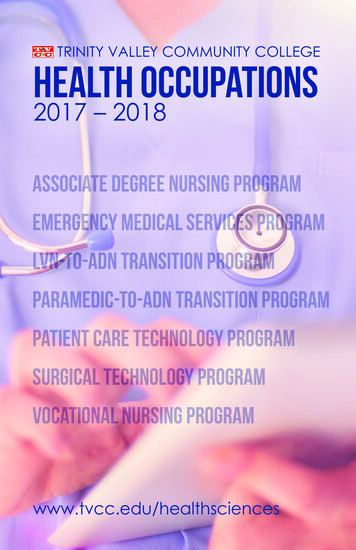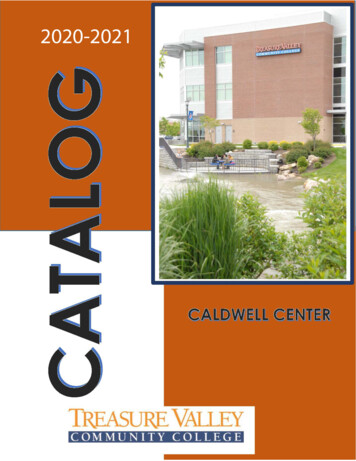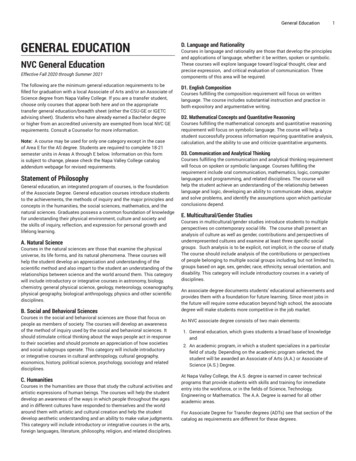
Transcription
General EducationGENERAL EDUCATIONNVC General EducationEffective Fall 2020 through Summer 2021The following are the minimum general education requirements to befilled for graduation with a local Associate of Arts and/or an Associate ofScience degree from Napa Valley College. If you are a transfer student,choose only courses that appear both here and on the appropriatetransfer general education/breadth sheet (either the CSU-GE or IGETCadvising sheet). Students who have already earned a Bachelor degreeor higher from an accredited university are exempted from local NVC GErequirements. Consult a Counselor for more information.Note: A course may be used for only one category except in the caseof Area E for the AS degree. Students are required to complete 18-21semester units in Areas A through E below. Information on this formis subject to change, please check the Napa Valley College catalogaddendum webpage for revised requirements.Statement of PhilosophyGeneral education, an integrated program of courses, is the foundationof the Associate Degree. General education courses introduce studentsto the achievements, the methods of inquiry and the major principles andconcepts in the humanities, the social sciences, mathematics, and thenatural sciences. Graduates possess a common foundation of knowledgefor understanding their physical environment, culture and society andthe skills of inquiry, reflection, and expression for personal growth andlifelong learning.A. Natural ScienceCourses in the natural sciences are those that examine the physicaluniverse, its life forms, and its natural phenomena. These courses willhelp the student develop an appreciation and understanding of thescientific method and also impart to the student an understanding of therelationships between science and the world around them. This categorywill include introductory or integrative courses in astronomy, biology,chemistry, general physical science, geology, meteorology, oceanography,physical geography, biological anthropology, physics and other scientificdisciplines.B. Social and Behavioral SciencesCourses in the social and behavioral sciences are those that focus onpeople as members of society. The courses will develop an awarenessof the method of inquiry used by the social and behavioral sciences. Itshould stimulate critical thinking about the ways people act in responseto their societies and should promote an appreciation of how societiesand social subgroups operate. This category will include introductoryor integrative courses in cultural anthropology, cultural geography,economics, history, political science, psychology, sociology and relateddisciplines.C. HumanitiesCourses in the humanities are those that study the cultural activities andartistic expressions of human beings. The courses will help the studentdevelop an awareness of the ways in which people throughout the agesand in different cultures have responded to themselves and the worldaround them with artistic and cultural creation and help the studentdevelop aesthetic understanding and an ability to make value judgments.This category will include introductory or integrative courses in the arts,foreign languages, literature, philosophy, religion, and related disciplines.1D. Language and RationalityCourses in language and rationality are those that develop the principlesand applications of language, whether it be written, spoken or symbolic.These courses will explore language toward logical thought, clear andprecise expression, and critical evaluation of communication. Threecomponents of this area will be required.D1. English CompositionCourses fulfilling the composition requirement will focus on writtenlanguage. The course includes substantial instruction and practice inboth expository and argumentative writing.D2. Mathematical Concepts and Quantitative ReasoningCourses fulfilling the mathematical concepts and quantitative reasoningrequirement will focus on symbolic language. The course will help astudent successfully process information requiring quantitative analysis,calculation, and the ability to use and criticize quantitative arguments.D3. Communication and Analytical ThinkingCourses fulfilling the communication and analytical thinking requirementwill focus on spoken or symbolic language. Courses fulfilling therequirement include oral communication, mathematics, logic, computerlanguages and programming, and related disciplines. The course willhelp the student achieve an understanding of the relationship betweenlanguage and logic, developing an ability to communicate ideas, analyzeand solve problems, and identify the assumptions upon which particularconclusions depend.E. Multicultural/Gender StudiesCourses in multicultural/gender studies introduce students to multipleperspectives on contemporary social life. The course shall present ananalysis of culture as well as gender, contributions and perspectives ofunderrepresented cultures and examine at least three specific socialgroups. Such analysis is to be explicit, not implicit, in the course of study.The course should include analysis of the contributions or perspectivesof people belonging to multiple social groups including, but not limited to,groups based on age, sex, gender, race, ethnicity, sexual orientation, anddisability. This category will include introductory courses in a variety ofdisciplines.An associate degree documents students’ educational achievements andprovides them with a foundation for future learning. Since most jobs inthe future will require some education beyond high school, the associatedegree will make students more competitive in the job market.An NVC associate degree consists of two main elements:1. General education, which gives students a broad base of knowledgeand2. An academic program, in which a student specializes in a particularfield of study. Depending on the academic program selected, thestudent will be awarded an Associate of Arts (A.A.) or Associate ofScience (A.S.) Degree.At Napa Valley College, the A.S. degree is earned in career technicalprograms that provide students with skills and training for immediateentry into the workforce, or in the fields of Science, Technology,Engineering or Mathematics. The A.A. Degree is earned for all otheracademic areas.For Associate Degree for Transfer degrees (ADTs) see that section of thecatalog as requirements are different for these degrees.
2General EducationArea A: Natural ScienceHIST-123World History 23Select 1 course (minimum 3 units) from the following;HIST-140History of Modern Latin America3HIST-142History of Mexico3HIST-145California HistoryHIST-150History of American Women 1600-1900HIST-152History of American Women Since 1900HSRV-120Introduction to Human Services3LGBT-120Introduction to Lgbt Studies in the Family,Education and Community3LGBT-121LGBT Communities, Family & Education inthe 21st Century3POLI-120Introduction to the Principles Of al Anthropology4ASTR-110Descriptive Astronomy3ASTR-111Practical Astronomy3BIOL-103Introduction to Nutrition3BIOL-105Human Biology4BIOL-110Survey of Biology4BIOL-112Introduction to Ecology3BIOL-117Wildlife Biology3BIOL-120General Biology4BIOL-218Human Anatomy5POLI-125Introduction to Modern Political Ideology3CHEM-110Introduction to Chemistry4POLI-135Comparative Government3CHEM-111Introduction to Organic & BiologicalChemistry4POLI-140International Relations3PSYC-120General Psychology3CHEM-120General Chemistry 15PSYC-123Social Psychology3EART-110Earth Science4PSYC-124Psychology of Adjustment3ENVS-115Energy, the Environment & Sustainability3PSYC-125Human Development3GEOG-110Physical Geography3PSYC-126Abnormal Psychology3GEOL-110Physical Geology3PSYC-128Cross-Cultural Psychology3HEOC-100Basic Anatomy & Physiology3PSYC-135Human Sexuality3PHYS-110Descriptive Physics3PSYC-220Research Methods in Psychology3PHYS-120General Physics 14SOCI-120Introduction to Sociology3PHYS-140Physics for Scientists & Engineers 14SOCI-122Social Problems3SOCI-123Social Psychology3SOCI-130Introduction to Queer Studies3SOCI-140Sociology of Sex and Gender3UnitsSOCI-150Sociology of Race & Ethnicity3Area B: Social and Behavioral SciencesSelect 1 course (minimum 3 units) from the following;11333CodeTitleADMJ-121Introduction to Criminal Law3SOCI-190Introduction to Social Research3ADMJ-122Introduction to Criminal Procedures3SPCOM-126Intercultural Communication3ADMJ-125Introduction to Evidence31ANTH-121Introduction to Cultural Anthropology3ANTH-122Magic, Witchcraft, and Religion3ANTH-130Introduction to Archaeology3Area C: HumanitiesANTH-131Mesoamerican Archaeology3Select 1 course (minimum 3 units) from the following;ANTH-145Medical Anthropology3ANTH-150Anthropology of Sex, Gender and Sexuality3ANTH-180The Anthropology of Childhood3ANTH-200Linguistic Anthropology3CFS-120Child Development3CFS-140The Child, Family and Community3CFS-180The Anthropology of Childhood3ECON-100Principles of Macroeconomics3ECON-101Principles of Microeconomics3ECON-120Economic History of the U.S.3ENGI-110Introduction to Engineering3GEOG-101World Regional Geography3HIST-120United States History 1HIST-121United States History 2HIST-122World History 111A.A. Degree only: courses chosen to satisfy the History andInstitutions requirement cannot be used to satisfy Area B.CodeTitleASL-120First Semester American Sign LanguageUnits5ASL-121Second-Semester American Sign Language5ANTH-150Anthropology of Sex, Gender and Sexuality3ARTH-105History of Western Art: Prehistoric ThroughMedieval3ARTH-106History of Western Art: Renaissance toContemporary3ARTH-118Survey of Modern Art3ARTH-130History of Asian Art3ARTH-135Arts of Africa, Oceania, and Native NorthAmerica33ARTH-180History of Photography33ARTS-100Foundations of Studio Arts33CFS-145Language Development & Early Literacy3
General EducationDANS-160Dance Appreciation3DANS-170Dance History3DART-101Graphic Design FoundationsDART-120Intro to Digital Art & Graphic Design3PHIL-129Introduction to Epistemology andMetaphysics33PHIL-131Introduction to Logic and Critical Thinking33PHIL-133World Philosophy3Advanced Composition and LiteraryAnalysis3PHIL-134Philosophy of Religion3PHIL-137Comparative Religions3Advanced Composition and CriticalThinking About Literature4PHOT-120Introduction to Photography3PHOT-180History of Photography3ENGL-213Survey of British Literature 13SPAN-111Elementary Spanish I (Part B)3ENGL-214Survey British Literature 23SPAN-120Elementary Spanish I5ENGL-215Survey of American Literature 13SPAN-121Elementary Spanish II5ENGL-216Survey of American Literature 23SPAN-240Intermediate Spanish diate Spanish II5ENGL-224Survey of Native American Literature3SPAN-280Spanish for Heritage Speakers I5ENGL-226Survey of African American Literature3SPAN-281Spanish for Heritage Speakers II5FILM-100Survey and Appreciation of Film3SPAN-282Introduction to Hispanic Literature3FILM-101Introduction to Film Production3THEA-100Introduction to Theater3FILM-102Survey of Film and Media3THEA-105Culture and Gender in Theater3FILM-105Film History: 1895-19493FILM-110Culture and Gender in Film3Area D: Language and RationalityFILM-115World Cinema3FILM-120Horror Film3Complete 3 courses with a grade of "C" or better, one each from D1, D2,and D3 (minimum of 9 units) from the following;FILM-121Film Comedy3FILM-125AFilm Genres: Film Noir3FILM-125BFilm Genres: Western3FILM-125CFilm Genres: Drama3FILM-125DFilm Genres: Musical3FREN-120First Semester French5FREN-121Second Semester French5HIST-122World History 13HIST-123World History 2HUMA-100The American Mind 1HUMA-101ENGL-121ENGL-123CodeTitleArea D1: English Composition1UnitsENGL-120College Compositon and Research4ENGL-120BReading and Composition Stretch 23Area D2: Mathematics2MATH-94Intermediate Algebra5MATH-95Foundations of Algebra for Math IntensiveFields53MATH-99Intermediate Algebra, Part B33MATH-106College Algebra4The American Mind 23MATH-108Trigonometry3HUMA-112Introduction to Africana Studies3MATH-115Applied Calculus5HUMA-113Introduction to Mex-American andChicana(o) Studies3MATH-120Calculus I5HUMA-125Introduction to Latin American Studies3MATH-121Calculus II5HUMA-151Women's Ethnic Heritage3MATH-130Mathematical Concepts for ElementarySchool Teachers-Number Systems3HUMA-160Filipina(o)-American Heritage3MATH-220Linear Algebra3HUMA-174Culture and Gender in Theater3MATH-221Multivariable Calculus5HUMA-186Culture and Gender in Films3MATH-222Differential Equations3ITAL-120First Semester Italian5MATH-232Statistics3ITAL-121Second Semester Italian5MATH-235Finite Mathematics3MUSI-110Fundamentals of Music3TECH-107Technical Mathematics II3MUSI-112Survey & Appreciation of Music3Area D3: Communication and Analytical ThinkingMUSI-114Survey & History of Jazz3ADMJ-123Introduction to Community Policing3MUSI-121Music Theory I3ADMJ-124Introduction to Investigation3MUSI-122Music Theory II3ASL-120First Semester American Sign Language5PHIL-120Introduction to Philosophy 13ANTH-150Anthropology of Sex, Gender and Sexuality3PHIL-121Introduction to Philosophy 23ANTH-200Linguistic Anthropology3PHIL-125Introduction to Ethics3ASTR-111Practical Astronomy3PHIL-127Feminist Philosophy3BIOL-103Introduction to Nutrition3PHIL-128Social and Political Philosophy3BIOL-110Survey of Biology4
4General EducationBIOL-112Introduction to Ecology3MATH-120Calculus I5BIOL-120General Biology4MATH-121Calculus II5BIOL-219Human Physiology5MATH-220Linear Algebra3BIOL-220General Microbiology5MATH-221Multivariable Calculus5BIOL-240General Zoology5MATH-222Differential Equations3BIOL-241General Botany5MATH-232Statistics3BUSI-103Legal Environment of Business3MATH-235Finite Mathematics3BUSI-297Personal Money Management3PHIL-120Introduction to Philosophy 13CHEM-110Introduction to Chemistry4PHIL-121Introduction to Philosophy 23CHEM-111Introduction to Organic & BiologicalChemistry4PHIL-125Introduction to Ethics3PHIL-126Contemporary American Ethics3CHEM-120General Chemistry 15PHIL-131Introduction to Logic and Critical Thinking3CHEM-121General Chemistry 25PHYS-110Descriptive Physics3CFS-123Observation & Assessment4PHYS-120General Physics 14CFS-135The Cognitive Development of YoungChildren3PHYS-121General Physics 24CFS-140The Child, Family and Community3PHYS-140Physics for Scientists & Engineers 14CFS-155Sensitive Issues in Early Childhood3PHYS-240Physics for Scientists & Engineers 24COUN-100College Success3POLI-125Introduction to Modern Political Ideology3EART-110Earth Science4POLI-135Comparative Government3ECON-100Principles of Macroeconomics3POLI-140International Relations3ECON-101Principles of Microeconomics3PSYC-124Psychology of Adjustment3ENGL-121Advanced Composition and LiteraryAnalysis3PSYC-135Human Sexuality3PSYC-220Research Methods in Psychology3Advanced Composition and CriticalThinking About Literature4RESP-120Respiratory Care Theory I6SOCI-122Social Problems3ENGL-125Advanced Composition & Critical Thinking3SOCI-190Introduction to Social Research3ENGL-200Introduction to Creative Writing 13SPAN-240Intermediate Spanish I5ENGL-201Introduction to Creative Writing 23SPAN-241Intermediate Spanish II5ENGL-202Introduction to Creative Writing 33SPAN-280Spanish for Heritage Speakers I5ENGL-213Survey of British Literature 13SPAN-281Spanish for Heritage Speakers II5ENGL-214Survey British Literature 23SPCOM-120Interpersonal Communication3ENGL-215Survey of American Literature 13SPCOM-122Public Speaking3ENGL-216Survey of American Literature 23SPCOM-124Career OM-126Intercultural Communication3ESL-106Oral Communication 34SPCOM-1283FILM-110Culture and Gender in Film3Critical Thinking: Argumentation andDebateHEOC-101Pharmacology3TECH-92Technical Mathematics 13HUMA-100The American Mind 13TECH-107Technical Mathematics II3HUMA-101The American Mind 23THEA-110Acting IHUMA-125Introduction to Latin American Studies3THEA-140Technical Theatre in ProductionHUMA-186Culture and Gender in Films3THEA-156Theater Production: ClassicalLIBR-100Becoming a Skilled ResearcherTHEA-210Acting III3MATH-90Beginning Algebra5THEA-244Acting IV3MATH-93Applied Algebra for Statistics3MATH-94Intermediate Algebra5MATH-95Foundations of Algebra for Math IntensiveFields5MATH-97Beginning Algebra, Part B3MATH-99Intermediate Algebra, Part B3MATH-106College Algebra4MATH-108Trigonometry3MATH-115Applied Calculus5ENGL-1233112331-31-3Writing competency can be demonstrated through the completion ofthe English composition requirements under GE area D1 with a "C" orbetter.Math competency can be demonstrated through tests offered bythe Assessment Center, or with completion of the Mathematicsrequirements under GE Area D2 with a grade of "C" or better.
General Education5Area E: Multicultural/Gender StudiesCodeEffective Fall 2001 for the A.S. Degree only, course taken for Area E maydouble count for one other area of GE, providing the course is listed inthat area.Group 1: U.S. HistoryHIST-120United States History 13Select 1 course (minimum 3 units) from the following;HIST-121United States History 23HIST-150History of American Women 1600-19003HIST-152History of American Women Since 19003TitleTitleUnitsSelect 1 course from the following;CodeTitleUnitsADMJ-123Introduction to Community Policing3ANTH-121Introduction to Cultural Anthropology3CodeANTH-145Medical Anthropology3Group 2: Political ScienceANTH-150Anthropology of Sex, Gender and Sexuality3Select 1 course from the following;ANTH-180The Anthropology of Childhood3POLI-120CFS-140The Child, Family and Community3CFS-180The Anthropology of Childhood3ENGL-224Survey of Native American Literature3ENGL-226Survey of African American Literature3FILM-110Culture and Gender in Film3HIST-145California History31. Students majoring in Health Occupation;HIST-150History of American Women 1600-19003HIST-152History of American Women Since 190032. Veterans with six months service receive unit credit for KINE (formerlyPHYE) and HELH 106.HCTM-126Culture and Cuisine33. Completion of the Police AcademyHSRV-124Working With Diverse Populations3HUMA-100The American Mind 134. Students who have already earned a Bachelor degree or higher from anaccredited university.HUMA-101The American Mind 23HUMA-112Introduction to Africana Studies3HUMA-113Introduction to Mex-American andChicana(o) Studies3HUMA-125Introduction to Latin American Studies3HUMA-151Women's Ethnic Heritage3HUMA-160Filipina(o)-American Heritage3HUMA-174Culture and Gender in Theater3HUMA-186Culture and Gender in Films3LGBT-120Introduction to Lgbt Studies in the Family,Education and Community3LGBT-121LGBT Communities, Family & Education inthe 21st Century3PHOT-182Photography in a Multicultural UnitedStates3PSYC-128Cross-Cultural Psychology3SOCI-130Introduction to Queer Studies3SOCI-140Sociology of Sex and Gender3SOCI-150Sociology of Race & Ethnicity3SPCOM-126Intercultural Communication3THEA-105Culture and Gender in Theater3Additional Graduation RequirementsAmerican History/Institutions Requirement (A.A. Degrees Only)Select 1 course from Group 1 and 1 course from Group 2. Courses chosento satisfy this requirement cannot be used to satisfy Area B. Students whohave already earned a Bachelor degree or higher from an accredited universityare exempt from the American History/Institutions Requirements.UnitsIntroduction to the Principles Of AmericanGovernment3Kinesiology/Health RequirementChoice of 3 units of Kinesiology (KINE) and/or Dance (DANS) courses orcomplete HELH-106.Exemptions:Math, Reading, and Writing Competencies Math competency can be demonstrated through tests offered bythe Assessment Center, or with completion of the Mathematicsrequirements under GE Area D2 with a “C” or better. Reading competency can be demonstrated with a grade of “C” orbetter in a transferable course with a strong reading component. Writing competency can be demonstrated through the completion ofthe English composition requirements under GE Area D1 with a “C” orbetter.CSU General EducationEffective Fall 2020 through Summer 2021A new CSU Gene
Science degree from Napa Valley College. If you are a transfer student, choose only courses that appear both here and on the appropriate transfer general education/breadth sheet (either the CSU-GE or IGETC advising sheet). Students who Dhave already earned a Bachelor degree or higher from an accr
